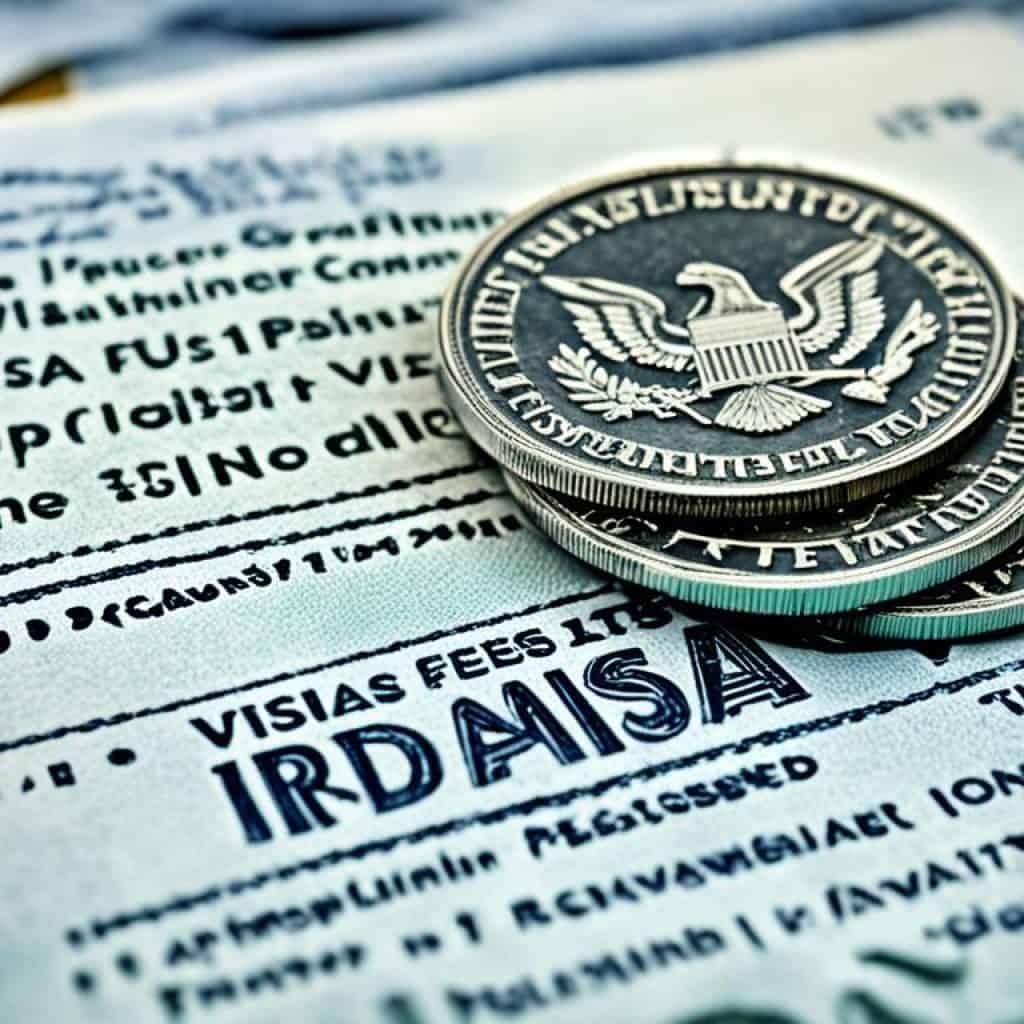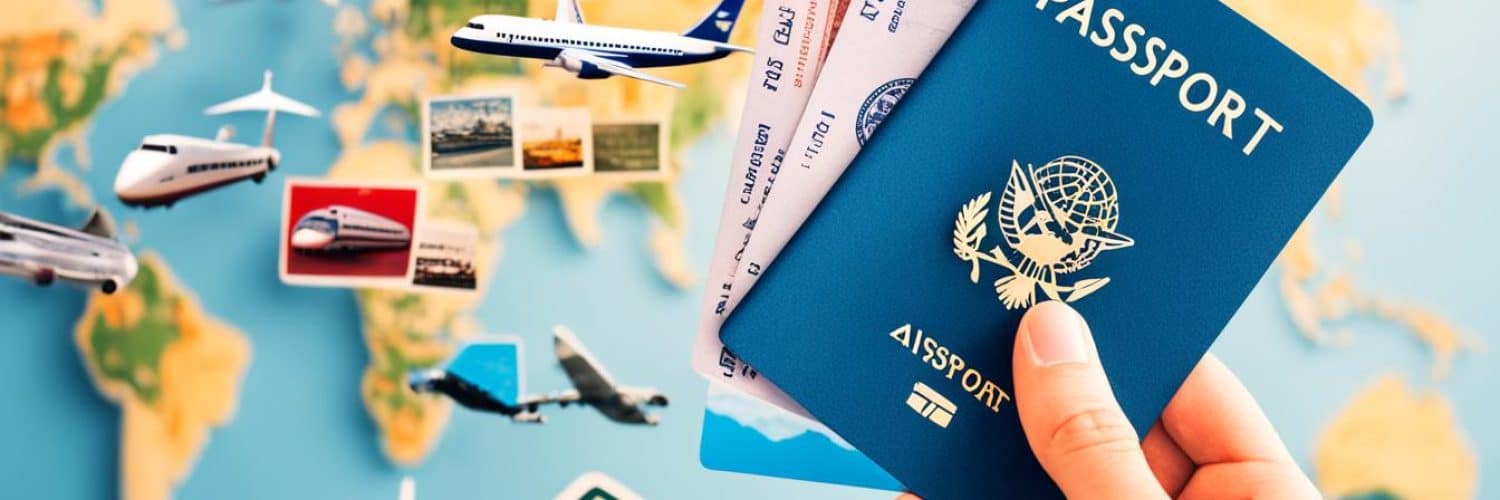Are you married to a US citizen and dreaming of building a life together in the United States? The IR-1 visa, also known as an immigrant visa, can make that dream a reality. But where do you begin? How does the process work? And what are the requirements?
In this comprehensive guide, we will demystify the IR-1 visa process and provide you with all the information you need to start your journey towards US permanent residency with your US citizen spouse. From understanding the eligibility criteria to navigating the application process, we will walk you through each step, ensuring that you are well-prepared to embark on this exciting endeavor.
Key Takeaways:
- Understanding the IR-1 visa: Learn about what an IR-1 visa is and how it can help you obtain US permanent residency.
- Eligibility requirements: Discover the criteria you need to meet in order to qualify for an IR-1 visa.
- Application process: Get a step-by-step guide on how to navigate the IR-1 visa application process.
- Required documents: Learn about the documents you need to gather and submit as part of your IR-1 visa application.
- Interview and approval process: Understand what to expect during your visa interview and how the approval process works.
What is an IR-1 Visa?
An IR-1 visa, also known as an immigrant visa, is a family-based visa category that allows the spouse of a US citizen to immigrate to the United States and obtain US permanent residency. It falls under the category of immediate relative visas, which are reserved for close family members of US citizens. The IR-1 visa is specifically for spouses who are already married to a US citizen and wish to live together permanently in the United States. It is a pathway to US permanent residency, also known as a green card.
Obtaining an IR-1 visa is an important step towards building a life together with your US citizen spouse in the United States. With this visa, you will have the opportunity to work, study, and enjoy the benefits of US permanent residency. The IR-1 visa offers stability and security, allowing you to establish roots in your new home and pursue your dreams.
Benefits of an IR-1 Visa
One of the major benefits of an IR-1 visa is the ability to live and work in the United States permanently. With this visa, you can enjoy the following advantages:
- Work Authorization: As an IR-1 visa holder, you can work legally in the United States without the need for additional work permits or visas.
- Social Security Number: You can apply for a Social Security Number (SSN), which is essential for various purposes such as opening bank accounts, applying for credit, and filing taxes.
- Access to Healthcare: As a US permanent resident, you can access healthcare services and benefits, including Medicare and Medicaid, depending on your eligibility.
- Education Opportunities: IR-1 visa holders have access to education opportunities, including public schools and colleges, and may be eligible for in-state tuition rates.
- Sponsor Family Members: Once you have obtained US permanent residency, you can sponsor certain family members for immigration to the United States, including your immediate relatives.
The IR-1 visa offers an exciting opportunity for couples to build a future together in the United States. Whether you plan to pursue a career, further your education, or raise a family, the IR-1 visa provides the foundation for a fulfilling life in the US.
Eligibility for an IR-1 Visa
To be eligible for an IR-1 visa, you must meet certain requirements. The key factors determining eligibility include your relationship with a US citizen spouse, the validity of your marriage, and the genuineness of your relationship. Let’s take a closer look at each requirement:
Marriage to a US Citizen
The first requirement is being married to a US citizen. The marriage must be legally recognized and valid in the country where it took place. This means that you must have followed all the necessary legal procedures and obtained the appropriate documentation to prove the legality of your marriage.
Sponsorship by a US Citizen Spouse
Your US citizen spouse must be willing to sponsor your immigration. This means they are taking responsibility for financially supporting you and ensuring you will not become a public burden in the United States. Your spouse will need to provide evidence of their US citizenship, such as a US passport or a Certificate of Citizenship.
Bona Fide Relationship
In addition to being married to a US citizen, you must prove that your relationship is genuine and not entered into solely for the purpose of immigration. This requirement is to prevent fraudulent marriages for immigration benefits. You will need to provide documentation and evidence of your marriage and relationship, such as joint bank accounts, property ownership, photographs, and affidavits from family and friends.
Meeting these eligibility requirements is crucial for a successful IR-1 visa application. It’s important to gather all the required documentation and evidence to support your case and provide a clear and convincing demonstration of the authenticity of your marriage and relationship.

| Eligibility Requirements | Details |
|---|---|
| Marriage to a US Citizen | Legally recognized and valid marriage |
| Sponsorship by a US Citizen Spouse | US citizen spouse willing to sponsor |
| Bona Fide Relationship | Genuine and not solely for immigration purposes |
The IR-1 Visa Application Process
The IR-1 visa application process is an important step towards obtaining US permanent residency for spouses of US citizens. Understanding the process and meeting the necessary requirements is crucial to ensure a smooth and successful application. Let’s explore the various stages involved in the IR-1 visa application process.
Petition Submission to USCIS
The first step in the IR-1 visa application process is submitting a petition to the US Citizenship and Immigration Services (USCIS). This petition serves to establish the relationship between the foreign spouse and the US citizen petitioner. It requires providing evidence of the bona fide marriage and meeting other eligibility criteria.
National Visa Center (NVC) Processing
Once the USCIS approves the petition, it is then forwarded to the National Visa Center (NVC) for further processing. The NVC will request additional documentation and fees, including the Affidavit of Support, civil documents, and the visa application form (DS-260). It is important to carefully follow the NVC’s instructions and provide all requested documents promptly.
Scheduling the Visa Interview
After completing the NVC processing, the next step is to schedule the visa interview at the US embassy or consulate in the applicant’s home country. The NVC will notify the applicant and provide instructions on how to proceed. It is essential to prepare for the interview by reviewing and organizing all required documents.
Medical Examination
Prior to the visa interview, the applicant will be required to undergo a medical examination to ensure they meet the health requirements for admission to the United States. The examination typically includes a medical history review, physical examination, and vaccinations. It is important to consult the designated medical provider and follow all necessary procedures.
Visa Interview and Decision
The visa interview is a critical part of the IR-1 visa application process. During the interview, a consular officer will review the documentation, ask questions about the relationship, and assess the applicant’s eligibility for the visa. It is essential to be prepared, present all required documents, and answer questions truthfully and confidently.
IR-1 Visa Application Process Summary
| Process Stage | Description |
|---|---|
| Petition Submission to USCIS | Submit a petition to establish the relationship between the foreign spouse and US citizen petitioner. |
| NVC Processing | Provide additional documentation and fees to the National Visa Center for further processing. |
| Scheduling the Visa Interview | Schedule the visa interview at the US embassy or consulate in the applicant’s home country. |
| Medical Examination | Undergo a medical examination to meet the health requirements for immigration to the United States. |
| Visa Interview and Decision | Attend the visa interview, present documentation, and answer questions from a consular officer to determine visa eligibility. |
Completing the IR-1 visa application process requires careful attention to detail and adherence to all requirements and instructions. It is advisable to seek professional guidance to ensure a smooth and successful journey towards US permanent residency.
Required Documents for an IR-1 Visa
When applying for an IR-1 visa, it is important to gather and submit the necessary documents to support your application. The required documents may vary depending on your specific circumstances and the requirements of the US embassy or consulate where you will have your visa interview.
The key documents that you will generally need to provide include:
- Marriage certificate: This document serves as proof of your legal marriage to a US citizen spouse. It should be an official document issued by the relevant authority in the country where your marriage took place.
- Birth certificates: You will need to submit birth certificates for both you and your spouse. These documents verify your identities and provide evidence of your relationship.
- Passports: Valid passports are required for both you and your spouse. Make sure that your passports are up to date and have enough validity remaining.
- Police clearances: You may be asked to provide police clearances from all countries where you have lived for more than six months. These clearances show that you have a good record and do not pose a security risk.
- Financial documents: It is important to demonstrate that you have the financial means to support yourself in the United States. This may include bank statements, tax returns, employment letters, or other relevant financial documents.
Additional documents, such as divorce decrees or death certificates if applicable, may be required depending on your personal circumstances. It is important to carefully review the specific document requirements provided by the US embassy or consulate where you will apply for your IR-1 visa.
Preparing your documents in advance and ensuring that you have all the necessary paperwork will help streamline the application process and increase your chances of a successful IR-1 visa application.
| Required Documents for an IR-1 Visa | Additional Documents (if applicable) |
|---|---|
| Marriage certificate | Divorce decrees |
| Birth certificates | Death certificates |
| Passports | – |
| Police clearances | – |
| Financial documents | – |
Interview and Approval Process for an IR-1 Visa
The IR-1 visa interview is a crucial step in the application process. At the interview, a consular officer will carefully review your documentation and ask you questions about your marriage and relationship. The consular officer’s primary objective is to determine if you meet the eligibility requirements for the visa.
Being well-prepared for the interview is paramount. Ensure that you have all the necessary documents and evidence to support your case. These may include your marriage certificate, photographs of your wedding, and any other documentation that proves the authenticity of your relationship. By providing comprehensive and convincing documentation, you can strengthen your case.
The consular officer will inquire about various aspects of your relationship to assess its genuineness. Questions may cover topics such as how you and your spouse met, your shared experiences, and your future plans as a married couple. Answer truthfully and confidently, and do not hesitate to provide additional information if requested.
It is important to approach the interview with confidence while remaining honest and forthcoming. Remember, the consular officer’s role is to ensure that the IR-1 visa is granted to eligible individuals. By demonstrating your genuineness and meeting the requirements, you increase your chances of a successful outcome.
If your application is approved, you will be issued an immigrant visa, paving the way for you to enter the United States and proceed with the process of obtaining your green card. This is an exciting step toward beginning your new journey in the United States with your US citizen spouse.
Processing Times for an IR-1 Visa
When applying for an IR-1 visa, it is important to understand that processing times can vary depending on several factors. The United States Citizenship and Immigration Services (USCIS), the National Visa Center (NVC), and the US embassy or consulate where your visa interview will be conducted all play a role in determining the overall processing time.
On average, the entire process of obtaining an IR-1 visa, from the initial petition to the visa interview and approval, can take several months to over a year. It is crucial to plan ahead and be aware of the potential waiting times when embarking on your IR-1 visa journey.
The USCIS is responsible for reviewing and approving the initial visa petition. The processing time at USCIS can vary, and it is important to check the USCIS website for the most up-to-date information on processing times.
After the USCIS approves the petition, it is forwarded to the NVC for further processing. The NVC will request additional documentation and fees before scheduling your visa interview at the US embassy or consulate in your home country. The processing time at the NVC can also vary, and it is advisable to check their website for the latest updates.
Once the NVC has completed its processing, your case will be forwarded to the US embassy or consulate where your visa interview will take place. The time it takes to schedule the interview and obtain a visa appointment can vary, depending on the workload of the embassy or consulate.
It is important to note that the processing times provided by USCIS, NVC, and the US embassy or consulate are estimates and can be subject to change. Delays and unforeseen circumstances can occur, impacting the overall processing time for your IR-1 visa application.
While it can be frustrating to wait for your IR-1 visa to be processed, it is crucial to remain patient and prepared throughout the entire process. Use this time to gather all the necessary documentation, attend any required medical examinations, and ensure that you have complied with all the requirements set forth by the USCIS, NVC, and the US embassy or consulate.
Remember, each case is unique, and processing times can vary. It is essential to stay updated on the latest information provided by USCIS, NVC, and the US embassy or consulate to have an accurate understanding of the estimated approval dates for your IR-1 visa.
Fees for an IR-1 Visa
In order to complete the IR-1 visa application process, there are several fees that you will need to pay. These fees cover various aspects of the application and processing, ensuring that the necessary steps are taken to obtain your visa.
The United States Citizenship and Immigration Services (USCIS) requires a filing fee for the initial petition. This fee must be submitted alongside your application to establish the relationship with your US citizen spouse.
Once your petition is approved by the USCIS, it will be forwarded to the National Visa Center (NVC), where additional fees will be required for document processing and visa application. These fees are essential for the NVC to continue processing your case and move it forward to the next stage.
In addition to the USCIS and NVC fees, there are other fees that you may encounter during the IR-1 visa application process. One such fee is the biometrics fee, which is collected for the purpose of obtaining your fingerprints. This fee is required by the US government as part of the background check process.
Furthermore, you may also be required to pay a visa processing fee at the US embassy or consulate where your visa interview will take place. This fee covers the administrative costs associated with the processing of your application and the scheduling of your interview.
It is important to note that the exact fees and payment instructions will be provided to you by the respective agencies during the application process. These fees are subject to change, so it is essential to remain updated on the current fee requirements.
Summary of IR-1 Visa Fees
| Fee | Description |
|---|---|
| USCIS Filing Fee | Required with the initial petition to establish the relationship with your US citizen spouse. |
| NVC Processing Fee | Required for document processing and visa application after USCIS approval. |
| Biometrics Fee | Collected for the purpose of obtaining your fingerprints as part of the background check process. |
| Visa Processing Fee | Collected at the US embassy or consulate for administrative costs associated with visa processing and scheduling of the interview. |

Maintaining Status and Obtaining a Green Card
Once you enter the United States on an IR-1 visa and obtain US permanent residency, it is crucial to maintain your status in order to remain in the country. US permanent residency is typically granted with conditions for the first two years of your stay. To remove these conditions and obtain a permanent green card, you will need to file Form I-751, Petition to Remove Conditions on Residence, with the United States Citizenship and Immigration Services (USCIS). It is important to note that this petition must be filed within 90 days before the expiration of your conditional green card.
Maintaining your IR-1 visa status is essential to ensure the continuity of your US permanent residency. By following the necessary steps and fulfilling the requirements, you can secure a permanent green card that allows you to reside in the United States without any limitations. Let’s explore the process of removing conditions from your US permanent residency.
What is Form I-751?
Form I-751, Petition to Remove Conditions on Residence, is an important document that is submitted to the USCIS to request the removal of the conditions on your US permanent residency. This form is specifically designed for individuals who obtained their permanent resident status through marriage to a US citizen, such as IR-1 visa holders. It is crucial to file this form on time to avoid jeopardizing your status.
Filing Form I-751
When filing Form I-751, you will need to provide evidence that your marriage is genuine and not solely for the purpose of obtaining immigration benefits. This evidence may include jointly filed tax returns, joint bank account statements, lease or mortgage agreements showing joint ownership or tenancy, utility bills in both your names, and any other documents that demonstrate your ongoing marital relationship. It is essential to gather and organize these documents to support your petition.
Additionally, you will need to pay the required filing fee and include any other supporting documents as specified by the USCIS. Once you have prepared your petition package, you should submit it to the USCIS according to their guidelines. It is recommended to keep copies of all the documents and correspondence for your records.
After Filing Form I-751
After you have submitted your Form I-751 petition, the USCIS will review your application and may request additional evidence or schedule an interview to further evaluate your case. It is crucial to respond promptly to any requests from the USCIS and provide any additional information or documentation they require.
Once your petition is approved, you will receive a Notice of Action (Form I-797) indicating that the conditions on your US permanent residency have been removed. This will allow you to live and work in the United States without restrictions, and your green card will be valid for the full ten-year period.
If your petition is denied, you may have the option to appeal the decision or file a motion to reopen or reconsider the case. It is important to consult with an immigration attorney or seek professional guidance to explore your options and determine the best course of action.
Rights and Benefits of an IR-1 Visa Holder
As an IR-1 visa holder and US permanent resident, you enjoy numerous rights and benefits that come with your immigration status. These privileges grant you the opportunity to build a fulfilling life in the United States alongside your US citizen spouse.
Right to Live and Work Permanently
One of the primary advantages of holding an IR-1 visa is the right to live and work permanently in the United States. This means you can establish your home, pursue employment opportunities, and contribute to the country’s economy.
Social Security Number
As an IR-1 visa holder, you are eligible to apply for a Social Security Number (SSN). The SSN serves as a unique identifier for tax and financial purposes, allowing you to work, pay taxes, open bank accounts, and access various government services.
Access to Healthcare and Education
Ability to Sponsor Family Members
As an IR-1 visa holder and US permanent resident, you have the privilege of sponsoring certain family members for immigration to the United States. This includes sponsoring your spouse, children, and in some cases, other close relatives, to join you and pursue their own American dreams.
Work Authorization for Dependents
If you have dependents, such as your spouse or children, they may also be eligible for work authorization in the United States. This allows them to legally seek employment and contribute to the family’s financial well-being.
“Having an IR-1 visa not only provides you with the opportunity to create a new life in the United States but also ensures that you and your family can enjoy the rights and benefits that come with being a US permanent resident.”
Summary of IR-1 Visa Rights and Benefits
| Rights and Benefits | Description |
|---|---|
| Right to Live and Work Permanently | Enjoy the freedom to establish your home and pursue employment opportunities in the United States. |
| Social Security Number | Apply for a Social Security Number, a unique identifier for tax and financial purposes. |
| Access to Healthcare and Education | Receive quality healthcare services and ensure your children have access to education in the US. |
| Ability to Sponsor Family Members | Sponsor certain family members to join you and pursue their own American dreams. |
| Work Authorization for Dependents | Dependent family members may be eligible for work authorization, allowing them to seek employment. |
Having an IR-1 visa grants you the opportunity to build a stable and prosperous future for yourself and your family in the United States. It is essential to familiarize yourself with these rights and benefits to fully make use of the privileges that come with your US permanent residency. Embrace the possibilities that await you as you embark on this exciting journey.

Maintaining Residence and Naturalization
Once you have obtained US permanent residency through an IR-1 visa, it is important to understand the requirements for maintaining your residency and the path to naturalization.
Residency Requirements
To maintain your US permanent residency, you must continue to reside in the United States as your primary place of residence. This means that you should spend the majority of your time living in the country, with only short and temporary absences.
In addition to physical presence, you must also demonstrate good moral character and comply with all US laws and regulations. It is essential to maintain a clean legal record and actively contribute to your community.
Naturalization Process
If you wish to become a US citizen, the naturalization process provides a pathway to obtaining US citizenship. To be eligible for naturalization, you must meet specific requirements set by the United States Citizenship and Immigration Services (USCIS).
The eligibility requirements for naturalization include:
- Being at least 18 years old.
- Having continuously resided in the United States for a specified period of time, typically five years (three years if married to and living with a US citizen).
- Demonstrating physical presence in the United States for a certain period of time.
- Being a person of good moral character.
- Demonstrating knowledge of the English language and US civics.
Application Process
To apply for naturalization, you need to complete and submit the Form N-400, Application for Naturalization, to the USCIS. The form requires detailed information about your background, immigration history, and eligibility for citizenship. You must provide supporting documentation, such as your green card, passport, and evidence of residency and good moral character.
After submitting your application, you will be scheduled for an interview with a USCIS officer. During the interview, you will be asked about your application and tested on your knowledge of English and US civics. If approved, you will attend a citizenship ceremony where you will take the Oath of Allegiance and officially become a US citizen.
Alternatives to the IR-1 Visa
The IR-1 visa is not the only option for couples seeking to live together in the United States. There are alternative visa options available, depending on your specific situation and preferences. Some of the alternatives to consider are:
K-1 Fiance Visa
The K-1 fiance visa is designed for couples who are engaged to be married. It allows the foreign fiance of a US citizen to enter the United States for the purpose of getting married within 90 days of arrival. After marriage, the foreign spouse can apply for adjustment of status to obtain US permanent residency.
K-3 Visa
The K-3 visa is available to spouses of US citizens who are waiting for their immigrant visa petition to be approved. It allows the foreign spouse to enter the United States while their immigration application is being processed. Once in the US, the foreign spouse can apply for adjustment of status to obtain US permanent residency.
Nonimmigrant Visas
In some cases, nonimmigrant visas can be used as alternatives to the IR-1 visa. For example, if the foreign spouse wishes to study in the United States, they can apply for a student visa. If the foreign spouse has a job offer in the US, they can apply for an employment-based visa. These nonimmigrant visas may have specific eligibility requirements and limitations, so it’s important to research and understand the options available.
Family-Based Immigration
Apart from the IR-1 visa, there are other family-based immigration options. For example, if you have a parent who is a US citizen, they may be able to sponsor you for a family-based visa. The eligibility requirements and application processes for these visas may vary, so it’s important to explore these options and determine the best course of action based on your specific circumstances.
It’s important to note that the eligibility requirements and application processes for these alternative visas may differ from the IR-1 visa. Consulting with an immigration attorney or seeking professional guidance can help you navigate the complexities of the various visa options, assess your eligibility, and choose the most suitable path to achieve your immigration goals.
Common Challenges and Issues with the IR-1 Visa Process
Applying for an IR-1 visa can introduce various challenges and issues throughout the process. It’s essential to be aware of these potential obstacles and prepare accordingly to overcome them. Some of the common challenges and issues include:
- Document Gathering: One of the initial hurdles is collecting all the required documentation. This includes marriage certificates, birth certificates, passports, and police clearances. Ensuring you have all the necessary paperwork can be time-consuming and may require collaboration with different agencies.
- Meeting Eligibility Requirements: IR-1 visa applicants must meet specific eligibility criteria, such as being married to a US citizen and having a bona fide relationship. Proving the authenticity of your marriage and relationship can be challenging, especially if you lack supporting documentation or face cultural or language barriers.
- Navigating the Application Process: The IR-1 visa application process involves several stages, including petitioning with the US Citizenship and Immigration Services (USCIS) and undergoing an interview at the US embassy or consulate in your home country. Understanding the steps and requirements of each stage can be overwhelming, particularly for individuals unfamiliar with the immigration system.
- Delays and Processing Times: The timeline for processing IR-1 visas can vary based on factors such as USCIS workload, National Visa Center (NVC) processing, and embassy or consulate availability. Delays in any of these stages can prolong the overall process and cause frustration for applicants eagerly awaiting their visa approval.
- Potential Denials: Despite careful preparation, IR-1 visa applications can still face denials. Common reasons for denials include insufficient supporting documentation, doubts about the authenticity of the relationship, or failure to meet eligibility requirements. Receiving a denial can be disheartening, but it’s important to explore options for appeal or reapplication.
While the IR-1 visa process may present its share of challenges, staying organized, seeking professional guidance when needed, and maintaining patience can help navigate these obstacles. Recognizing and addressing potential issues proactively increases the likelihood of a successful IR-1 visa application.
Seeking Professional Assistance for the IR-1 Visa Process
The IR-1 visa process can be complex and overwhelming, but don’t worry, you don’t have to navigate it alone. Seeking professional assistance from an immigration attorney or consultant can greatly enhance your chances of a successful IR-1 visa application.
Immigration attorneys and consultants are well-versed in the intricacies of the immigration system and can provide you with expert guidance, legal advice, and assistance throughout the entire visa process. They have in-depth knowledge of the requirements and documentation needed, ensuring that your application is complete, accurate, and meets all the necessary criteria.
An immigration attorney or consultant can:
- Guide you through the application process, helping you understand the steps involved and the documents needed.
- Review and assess your eligibility for the IR-1 visa, ensuring that you meet all the necessary requirements.
- Advise you on how to present your case effectively, highlighting the strengths of your application and addressing any potential weaknesses.
- Assist with the preparation and organization of your application, making sure that all the required forms and supporting documents are submitted correctly and on time.
- Navigate any challenges or issues that may arise during the process, such as requests for additional documentation or interviews.
- Prepare you for the visa interview, ensuring that you are well-prepared and confident when meeting with the consular officer.
While seeking professional assistance is not mandatory, it can significantly increase your chances of a successful outcome. An immigration attorney or consultant has the expertise and experience to handle complex immigration matters and can provide you with the peace of mind and confidence you need throughout the entire IR-1 visa process.
Remember, choosing the right professional is crucial. Take the time to research and find a reputable immigration attorney or consultant who specializes in family-based visas and has a proven track record of success. Don’t hesitate to schedule consultations to discuss your case and assess their suitability for your specific needs.
By seeking professional assistance, you can ensure that your IR-1 visa application is in capable hands, allowing you to focus on building a future with your US citizen spouse in the United States.
Tips for a Successful IR-1 Visa Journey
Embarking on your IR-1 visa journey requires thorough preparation and organization to ensure a successful application process. To help you navigate this process with confidence, here are some valuable tips:
- Gather all the necessary documentation: Assemble all required documents, including marriage certificates, birth certificates, passports, police clearances, and financial records. Ensure that these documents are accurate, up-to-date, and well-organized.
- Review the eligibility requirements: Familiarize yourself with the eligibility criteria for the IR-1 visa, such as being married to a U.S. citizen and establishing a bona fide relationship. Understanding these requirements will help you gather the necessary evidence to support your application.
- Understand the application process: Take the time to thoroughly comprehend each step of the IR-1 visa application process. Research the roles and responsibilities of the U.S. Citizenship and Immigration Services (USCIS), the National Visa Center (NVC), and the U.S. embassy or consulate where your interview will take place.
- Practice for your visa interview: Prepare for your visa interview by practicing potential questions with your spouse. Familiarize yourself with the documentation you will present and be able to confidently discuss the details of your marriage and relationship.
- Communicate effectively: Maintain clear and open communication with the relevant authorities throughout the application process. Respond promptly to any requests for additional information or documentation, and notify them of any changes in your circumstances.
- Be patient: The IR-1 visa process can be lengthy and may involve waiting for USCIS approval, document processing at the NVC, and scheduling your visa interview. Stay patient and trust that each step is essential to ensuring a thorough evaluation of your application.
By following these tips, you can increase your chances of a smooth and successful IR-1 visa application. Remember, patience, preparation, and effective communication are key to achieving your goal of obtaining US permanent residency.
Conclusion
The IR-1 visa offers a valuable opportunity for spouses of US citizens to obtain US permanent residency and build a future together in the United States. As a family-based visa category, it provides a clear pathway for couples who are already married and wish to live together permanently.
While the immigration process may seem complex, proper preparation and guidance can help navigate the requirements and procedures successfully. The key to a successful IR-1 visa journey lies in thorough documentation, understanding the eligibility criteria, and effective communication throughout the process.
By embarking on your IR-1 visa journey, you are taking a significant step towards securing US permanent residency and building a life with your US citizen spouse. With patience, determination, and the right resources, you can overcome any challenges that may arise and achieve your goal of obtaining US permanent residency.
FAQ
What is an IR-1 Visa?
An IR-1 visa is a family-based immigrant visa that allows the spouse of a US citizen to obtain US permanent residency. It is specifically designed for couples who are already married and wish to live together in the United States.
What are the eligibility requirements for an IR-1 Visa?
To be eligible for an IR-1 visa, you must be married to a US citizen. The marriage must be legally recognized and valid in the country where it took place. The US citizen spouse must be willing to sponsor your immigration and provide evidence of their US citizenship.
What is the application process for an IR-1 Visa?
The IR-1 visa application process involves submitting a petition to the USCIS, which will then be forwarded to the NVC for further processing. Additional documentation and fees will be requested, and a visa interview will be scheduled at the US embassy or consulate in your home country.
What documents are required for an IR-1 Visa?
Required documents for an IR-1 visa may include a marriage certificate, birth certificates, valid passports, police clearances, and financial documents. The specific list of required documents may vary depending on individual circumstances and embassy or consulate requirements.
What happens during the IR-1 Visa interview?
At the visa interview, a consular officer will review your documentation, ask questions about your marriage and relationship, and determine if you meet the eligibility requirements for the visa. A medical examination will also be required to ensure you meet the health requirements for immigration.
How long does the IR-1 Visa process take?
The processing times for an IR-1 visa can vary, but the entire process from the initial petition to the visa interview and approval can take several months to over a year.
What are the fees associated with the IR-1 Visa?
There are several fees associated with the IR-1 visa application process, including filing fees, document processing fees, biometrics fees, and visa processing fees. The exact fees and payment instructions will be provided by the respective agencies during the application process.
How do I maintain my US permanent residency obtained through an IR-1 Visa?
To maintain your US permanent residency, you must continue to reside in the United States. You may need to file a petition to remove the conditions on your green card within 90 days before its expiration.
What rights and benefits do I have as an IR-1 Visa holder?
As an IR-1 visa holder and US permanent resident, you have the right to live and work permanently in the United States. You can also apply for a social security number, access healthcare and education services, and sponsor family members for immigration to the United States.
What are the alternatives to the IR-1 Visa?
Alternatives to the IR-1 visa include the K-1 fiance visa and the K-3 visa, which are nonimmigrant visas for the fiance and spouse, respectively. These visas allow the foreign spouse to enter the United States and eventually adjust status to US permanent residency.
What are some common challenges and issues with the IR-1 Visa process?
Common challenges with the IR-1 visa process may include gathering the necessary documentation, meeting the eligibility requirements, and navigating the various stages of the application process. There is always a chance of visa applications being denied, but there are often options for appeal or reapplication.
Should I seek professional assistance for the IR-1 Visa process?
While professional assistance is not required, seeking the guidance of an immigration attorney or consultant can provide valuable advice, assistance with the application process, and help navigate any challenges or issues that may arise.
What tips do you have for a successful IR-1 Visa journey?
To have a successful IR-1 visa journey, it is important to be well-prepared and organized. Gather all the necessary documentation, review the eligibility requirements, practice for your visa interview, and be patient throughout the process.








Add comment